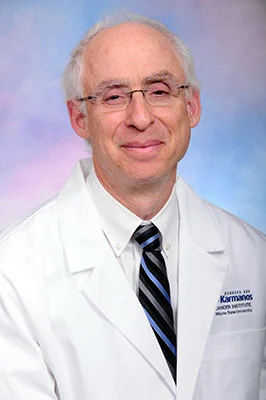Advancing Breast Cancer with Innovative, Patient-Centered Therapies
Groundbreaking advancements are reshaping cancer care at the Barbara Ann Karmanos Cancer Institute and Wayne State University School of Medicine. Researchers are pioneering bold, patient-centered therapies designed to battle breast cancer more effectively, ease patients’ journeys, reduce side effects, and enhance quality of life.

Approximately one in eight women are projected to develop invasive breast cancer in their lifetime. Through research and innovation, Karmanos oncology experts are working to improve survival rates and quality of life for patients across various stages of the disease.
Michael Simon, M.D., MPH, medical oncologist, co-leader of the Breast Cancer Multidisciplinary Team (MDT), medical director of the Karmanos Cancer Genetic Counseling Service, and professor of internal medicine and oncology, is encouraged by the latest therapeutic breakthroughs.
“There are a number of new treatments targeting specific types of breast cancer, allowing us to both prevent recurrence and treat advanced cases with more tolerable, life-saving medications,” he said.
This tailored treatment offers hope for more effective outcomes with fewer adverse effects, which has been a long-standing goal in breast cancer care. Through continuous advancements in targeted therapies, breast cancer care is moving closer to a future where treatments are not only more effective but easier on the body.

One groundbreaking area of research focuses on cellular therapies that use a patient’s immune system to combat cancer from within. Hadeel Assad, M.D., medical oncologist, co-leader of the Breast Cancer MDT, member of the Phase I Clinical Trials MDT, and associate professor in the Department of Oncology, underscored the potential of these new treatment approaches.
“Cellular therapy could be transformative,” she said. “By enhancing the patient’s own immune t-cells in the lab to fight their cancer, we could achieve a one-time infusion that potentially keeps cancer at bay for years.”
Black women are often diagnosed at more advanced stages and face higher mortality rates. Karmanos and Wayne State is also committed to addressing this critical health disparity through research that is expanding access to early detection and targeted treatments to reach at-risk populations, including a focus on medical care and the social factors that influence health outcomes. Genetic counseling is another key tool, allowing clinicians to identify individuals at higher genetic risk and provide an increased chance of early detection.
“We will continue to be involved in national studies looking at new treatment options for women at every stage of the disease trajectory from screening, prevention, and treatment of early and advanced breast cancer,” said Simon.
To learn more about breast cancer care at Karmanos, click here.
Originally published at Today@Wayne.

